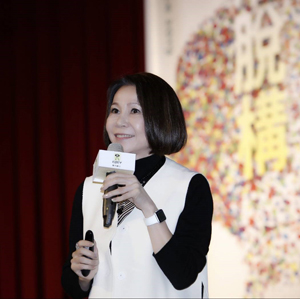03.2019 Office Talk
A brief talking On Shen Qian from "Jia Yi lun"
Far Eastern New Century Corporation / Liu Zuliang


From ancient times till now, there have been countless people who have never met with talent, sighing under the stars, lamenting that "thousands of miles horses are common, but Bole is not common." Although in any era, leaders who are able to know, love and use talent are indeed rare, but can they really be blamed on leaders if they fail to meet talent? Or should "talent" itself take some responsibility? Su Shi's "Jia Yi Lun" is from this point of view to talk about the "encounter and encounter" of talents.
Since the Shang and Zhou Dynasties, China's history has witnessed many faulty destinies, and many talented people have ended up gloomy, such as stars. Why did Su Shi choose Jia Yi as an example? Personally, in writing, the author often speaks for himself through the ancients or cites his ideas by the ancients, so this "spokesperson" is usually similar to the author to some extent. With Su Shi's talent, would his chosen "spokesperson" be an idle generation? Let's first look at Jia Yi's life.
Born in 200 B.C., Jia Yi was a famous scholar and politician in the early Western Han Dynasty. At the age of eighteen, Jia Yi was famous for his articles. He was appreciated by Lieutenant Wu Ting of Taishou County, Henan Province. He was listed under the door and recommended to Emperor Liu Heng of Han Dynasty. Therefore, Jia Yi was recruited into the Dynasty and established as a doctor. In one year, he was promoted to doctor Taizhong; he was only 22 years old, and he was a typical teenager.
However, Jia Yi did have genuine talent and practical learning. Several articles, such as "On Passing Qin Dynasty", "Policies for Public Security", "On Storage and Sparseness", were very insightful, and they touched on the social problems and the disadvantages of governance at that time. In his "Policies for Public Security", he wrote a passage: "All the princes built up without their strength." (Note) This is indeed the best solution to the problem of the feudal end of the early Han Dynasty. If Emperor Wen and Jing could listen to it, there would be no chaos in the seven countries after that.
Despite the ability to assist the emperor and the support of Emperor Wendi of the Han Dynasty, Jia Yi was still hindered by many senior officials in promoting the reform. At that time, the elders of the dynasty, such as Baby-feeding and Zhou Bo, were basically old-fashioned, old-fashioned, conservative, and incompatible with Jia Yi, a young and talented intellectuals who advocated reform. On the one hand, the elders thought Jia Yi was young and junior, despised him, on the other hand, jealous of his talent; on the other hand, Jia Yi also had the pride and obstinacy of intellectuals, and was not soft enough to buy the accounts of these old ministers. Finally, he was sent to Changsha as the king's Taifu, away from the political center.
The ambitious person must have the patience to wait for the opportunity; the person who wants to achieve great achievements must have the patience that ordinary people cannot bear. Since ancient times, most of the talents have the ability to build up their achievements and realize their aspirations, but few of them can really exert their talents. These people are not necessarily the fault of the emperor, sometimes it is the problem of talent itself; Su Shi thinks Jia Yi is not reused, and he himself has a great responsibility, so he said in the article: "If you get a king like Chinese, you still don't need to die; otherwise, there is no Yao and Shun in the world, and you can't do anything at all?" It means that Jia Yi can't walk around the world when he meets a good emperor like Emperor Wendi of Han Dynasty, so can't he do anything without a saint like Yao and Shun? Su Shi also took Confucius and Mencius'practice of traveling around other countries as an example, emphasizing that even sages like Confucius and Mencius could only be modest and cautious when they sought opportunities to exert their ambitions. With a turn of the tongue, he pointed out the problem of the incompatibility between Jiayi and Zhou Bo, and the old ministers such as infant-feeding. He believed that "Zhou Bo and baby-feeding contributed a lot to the emperor's throne, and unless they were the two, the world of Liu's family would probably have been replaced by Lv's family." Today, Jia Yi is just a young man from Luoyang. He is a brilliant scholar. But how can it happen that he wants the emperor to replace these outstanding old ministers overnight and use a young man in his twenties to govern? "
Su Shi went on to say, "If Jia Yi can continue to gain the attention of the monarch and maintain good relations with the ministers below, the emperor will not doubt his ability and loyalty, and the ministers will not be jealous of his talent, and then come to power, it will be a success and everyone will be expected to return." But wait for another ten years, and your ambitions will surely be fulfilled. "
In my opinion, Su Shi's reflection on his own life. Like Jia Yi, he was brilliant and famous at a young age. He was proud of his talent (Su Dongpo and Cheng Yi, Sima Guang, Wang Anshi and so on had conflicts, but fortunately these people were all gentlemen and stopped talking about things on the spot). Later, because of the Wutai poem case, people almost died in vain. Fortunately, Queen Cao pleaded for love and avoided death, but life has been tortuous ever since. Later talent has a wonderful "Red Cliff Fu" to read, Mr. Dongpo can also be a "look back on the always bleak place, return, there is no rain or sunshine" to move the ancient readers.
However, the author thinks that Su Shi may have taken things too simply. Although to reform the current politics, we must throw ourselves into politics and wait, as if cooking is impossible without going into the kitchen, and some Kungfu dishes just take time. However, after years of immersion in political struggle and struggle, can Jia Yi still be the original Jia Yi? Can he remain unchanged from the original intention of reform? I'm afraid there's no doubt about it. In history, no matter the French Revolution, the Chinese Revolution, or even the Latin American Revolution, how many reform aspirants have become the object of reform after the administration! It is difficult for us to keep our ideals unchanged. It is even more difficult for us to keep our ideals at the same time, we can also roam in the bureaucratic culture of being kind to others. It is doubtful whether Yijiayi's personality can be modified in this way.
At the end of the article, it is pointed out that Jia Yi's problem lies in "ambition is big and quantity is small, then there is more than enough and knowledge is insufficient". According to the author's opinion, such a problem shows that Jia Yi is not a person who can sneak in the officialdom, grind a sword for ten years and wait for opportunities.

"Thousand-mile horse often exists, Bole seldom exists." The so-called Thousand-mile horse here refers to the talented person with excellent knowledge and ability, and does not take into account this person's demeanor and vision. Because without these two traits, such talents tend to be arrogant, crazy and irritable. Arrogance is self-righteous, and can not be modest admonishment; madness is blind, light use of its edge; impatience is short-sighted and short-sighted, violent tiger Fenghe. As long as there is one of these three faults, I'm afraid that the real Bole will stay away!
From ancient times to modern times, most of the world's living beings are far inferior to Jia Yi in terms of intelligence and ability, but the manic persistence of being unable to tolerate, wait, and listen to disobedient loyalty far surpasses Jia Yi's! ___________ Therefore, is it true that thousands of miles are common, while Bole is rare? Or is the real Qianlima and Bole already extinct?
Jinan has been locked in fog for seven consecutive days, looking out of the window at a hazy, vicissitudes of life. Suddenly, I think of "the mist on the Yanbo River makes people sad", I think of "not seeing the dust in Chang'an", and I think of "this peace of mind is my hometown".
Note: Emperor Gaozu of the Han Dynasty declared his descendants king, stationed in different places, and called for "the king who is not surnamed Liu, the world will fight together". However, these Liu kings, who had stayed in the feudal territory for a long time, gradually became warlords who controlled finance and force. Some of them, owing to their vast feudal territory, had higher generations in their families than the emperor, and began to show disobedience to the central government of the Western Han Dynasty. Jia Yi suggested that after the death of these feudal kings, the central government would distribute their territory to all their sons, so that after several generations, each feudal king's territory would become smaller and smaller, which would not be enough to compete with the central government.#



















